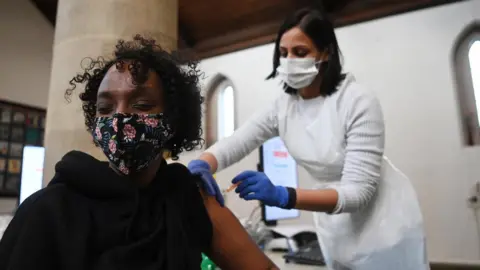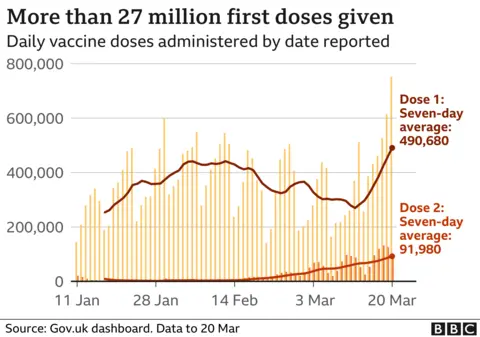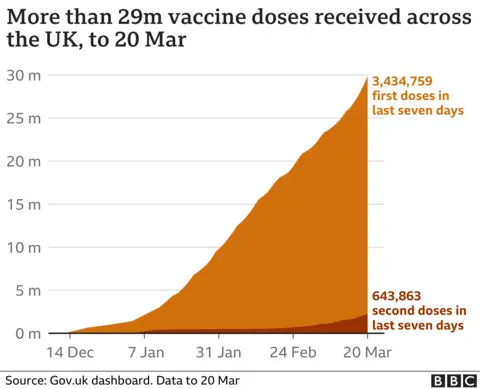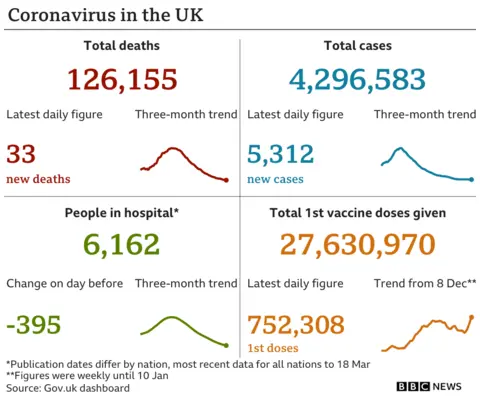Covid-19: Record-breaking day with 844,285 vaccine doses given in UK
 EPA
EPAThe number of daily Covid-19 vaccine doses administered in the UK has hit a record high for a third consecutive day.
A combined total of 844,285 first or second doses were given on Saturday, up from 711,157 on Friday.
On Twitter, Prime Minister Boris Johnson thanked "everyone involved".
More than 27.6 million people in the UK - more than half the adult population - have now received at least one dose of a vaccine.
Mr Johnson, who received his first dose on Friday, said: "A huge thank you to everyone involved and please come forward to get your jab when you are invited to do so."
Sir Simon Stevens, chief executive of NHS England, added: "In just one day we vaccinated the equivalent of the entire adult populations of Liverpool, Southampton and Oxford combined."
A slightly higher daily total of 873,784 was initially reported by the PM and Health Secretary Matt Hancock, who added later the figures from Scotland had "been revised down slightly" but it was "still our record day".
Of the vaccinations administered on Saturday, 752,308 were first doses and 91,977 were second, meaning 2,228,772 people in the UK have now been fully vaccinated.
A further 33 deaths within 28 days of a positive test have also been recorded, taking the UK's total by that measure to 126,155.
There have also been another 5,312 confirmed cases of coronavirus in the UK.

The new vaccine record comes after Defence Secretary Ben Wallace warned the EU not to "build walls" around the distribution of vaccines.
Speaking to the BBC's Andrew Marr Show after a threat by the European Commission to block vaccine exports to countries including the UK, Mr Wallace said: "The European Union stands for the rule of law... and that means we should all abide by our contracts.
"We are legally all obliged, both the buyer and the purchaser."
EU Commissioner Mairead McGuinness said all sides needed to "calm down".
"I think all of us should put our hands up and say we were not prepared for this global pandemic," she said. "We did not do our best at the beginning but we are doing our best now to protect our citizens.
"I think we all need to, if you like, calm down, look very... dispassionately at the situation around the raw materials for vaccines, around where they are produced and how we might ramp up that production."
Despite the success of the vaccine rollout, Mr Wallace did not rule out extending England's ban on overseas holidays amid rising cases in other countries.
Mr Wallace said booking a trip abroad would be "premature".
It comes after a scientist on a government advisory body said summer holidays overseas are "extremely unlikely" because of the risk that travellers will bring coronavirus variants to the UK.
The earliest date people in England could holiday abroad is 17 May.
The Scottish and Welsh governments also said international travel will not be possible before 17 May, while Northern Ireland has not set a date.

Meanwhile, a leading epidemiologist has predicted that people may need to wear face coverings and socially distance for several years before a return to normality.
Dr Mary Ramsay, the head of immunisation at Public Health England, said basic measures could be in place until other countries successfully roll-out jabs.
She said people "have got used to those lower-level restrictions now, and people can live with them, and the economy can still go on with those less severe restrictions in place".
"So I think certainly for a few years, at least until other parts of the world are as well vaccinated as we are, and the numbers have come down everywhere, that is when we may be able to go very gradually back to a more normal situation."


- HAVE A LAZY LOCKDOWN SUNDAY WITH US: Check out the great selection of films on BBC iPlayer
- COVID CONFIDENTIAL: How did the government make key decisions during the pandemic?

